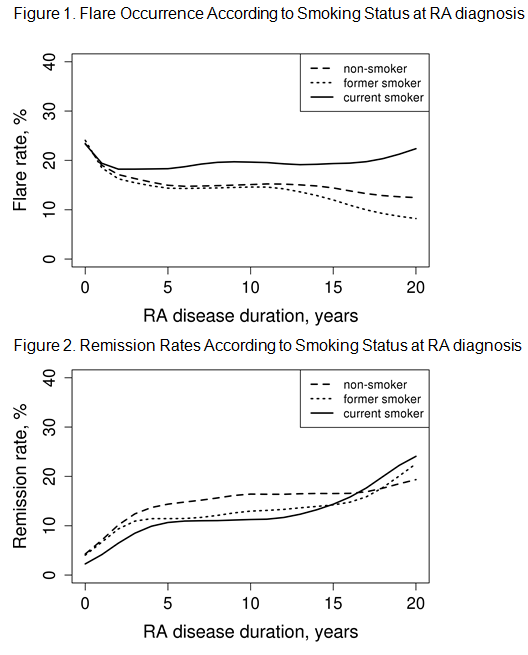Session Information
Date: Monday, November 14, 2016
Title: Rheumatoid Arthritis – Clinical Aspects II: Risk and Impact of Comorbidity
Session Type: ACR Concurrent Abstract Session
Session Time: 2:30PM-4:00PM
Background/Purpose: Smoking is well recognized as a risk factor for rheumatoid arthritis (RA), and determinant of RA disease activity, severity, response to therapy, and possibly mortality. However, long-term data on flare rates in RA among patients with smoking history are lacking. The purpose of this study was to assess trends in the occurrence of flares and remissions in RA among smokers and non-smokers.
Methods: A population-based cohort of patients with RA (age≥18 years; 1987 ACR criteria met in 1988-2007) was used to perform this retrospective medical records review of each clinical visit to estimate flare and remission status. RA flare was defined as any worsening of RA activity leading to initiation/change/increase of therapy (OMERACT 9). Remission was defined as the absence of disease activity (i.e. tender joint count [TJC] = 0 + swollen joint count [SJC] = 0 + ESR ≤ 10 mm/hr) (OMERACT 7). All subjects were followed until death, migration or July 1, 2012. Binomial regression models with random effects to account for multiple visits per subject were used to assess the association between smoking status and flare/remission rates adjusting for age, sex, and calendar year. Smoothing splines were used to allow for non-linear effects. Two way interactions between RA disease duration and smoking status were examined.
Results: The study included 650 RA patients (mean age 55.8 years; 69% female) with mean follow up of 10.3 years. Flare/ remission status was collected for a total of 17,323 clinical visits. Patients were flaring in 2887 (17%) visits and were in remission in 1747 (10%) visits. Current smokers had higher flare rates than non-smokers (p=0.047) and former smokers were not different from non-smokers (p=0.87; Figure 1). A borderline interaction between smoking status and RA disease duration indicated there were no differences in flare rates by smoking status during the first few years of RA disease duration, but subsequently current smokers had higher flare rates as compared to non-smokers (p=0.072). The pattern of RA disease flares over the follow up time was similar among former smokers and non-smokers (p=0.16). The overall rate of remission by baseline smoking status was significantly lower in current smokers than non-smokers (p=0.034; Figure 2). There was no difference in remission rates for former smokers compared to non-smokers (p=0.24), and no indication that remission rates differed over the disease course for current smokers (interaction p=0.42) or former smokers (interaction p=0.93) compared to non-smokers.
Conclusion: In this long term followup study, current smokers have higher rates of flares compared to non-smokers. Concordantly, remission rates were lower in smokers compared to the non-smokers. Smoking adversely affects RA flare/ remission. These findings should be helpful in counseling patients with RA who smoke.
To cite this abstract in AMA style:
Raheel S, Crowson CS, Matteson EL, Myasoedova E. Smoking Is Associated with Unfavorable Flare/ Remission Pattern in Patients with Rheumatoid Arthritis [abstract]. Arthritis Rheumatol. 2016; 68 (suppl 10). https://acrabstracts.org/abstract/smoking-is-associated-with-unfavorable-flare-remission-pattern-in-patients-with-rheumatoid-arthritis/. Accessed .« Back to 2016 ACR/ARHP Annual Meeting
ACR Meeting Abstracts - https://acrabstracts.org/abstract/smoking-is-associated-with-unfavorable-flare-remission-pattern-in-patients-with-rheumatoid-arthritis/

